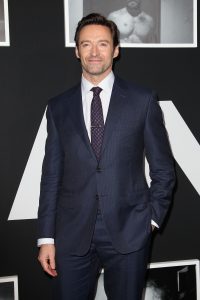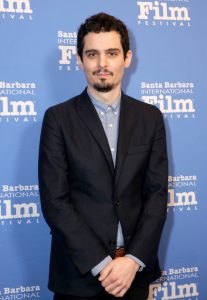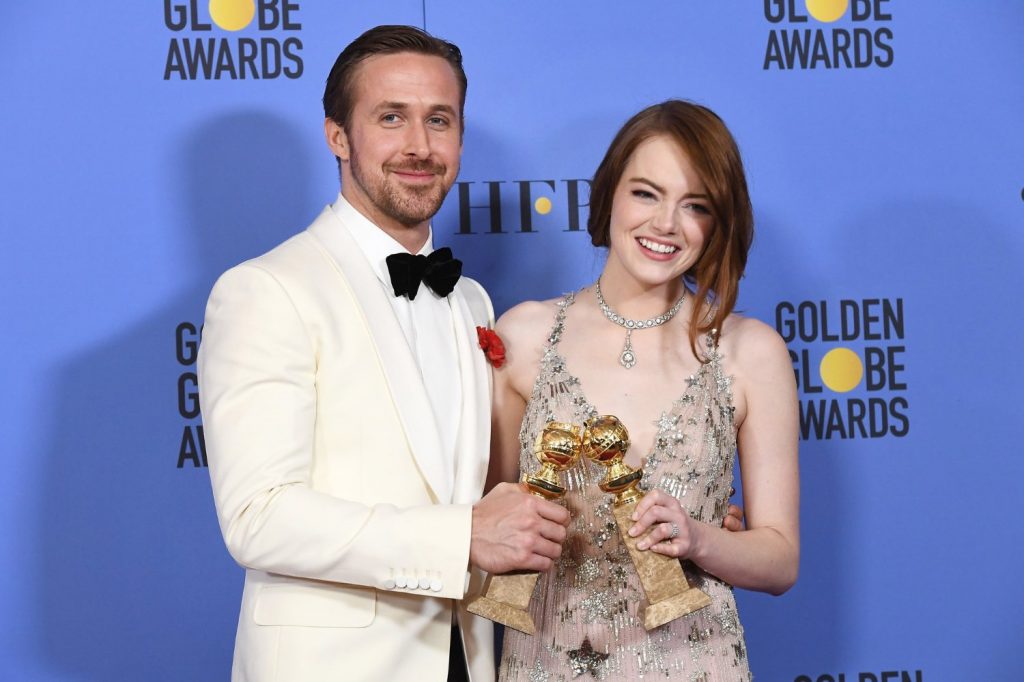December 16, 2022
by Carla Hay
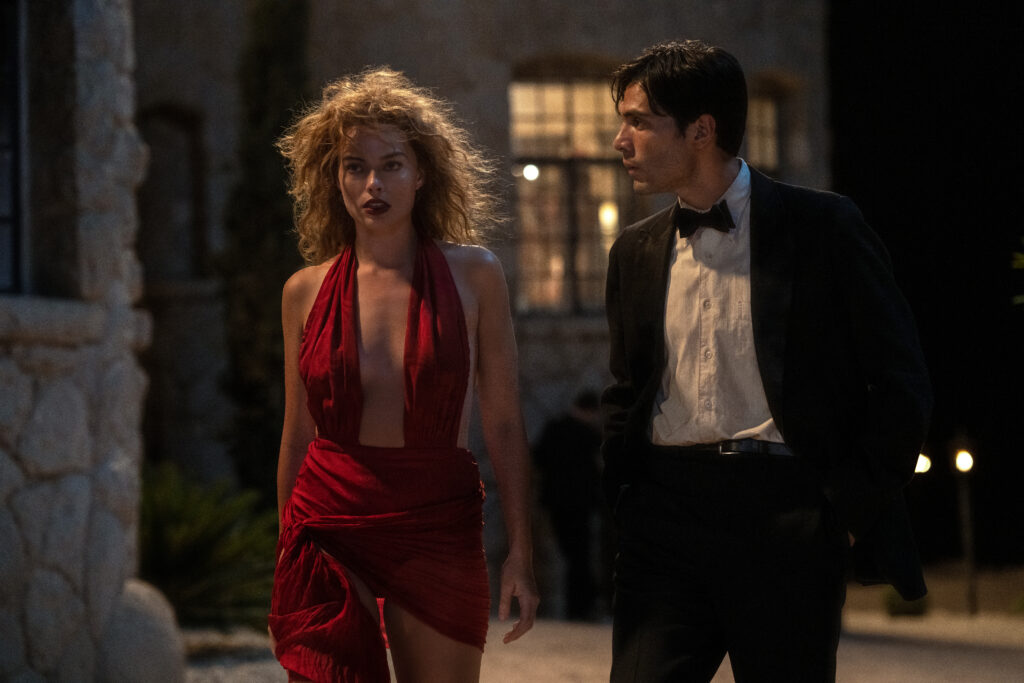
Directed by Damien Chazelle
Some language in Spanish and French with subtitles
Culture Representation: Taking place in the Los Angeles area, from 1926 to 1952, the dramatic film “Babylon” features a predominantly white cast of characters (with a few Latinos, African Americans and Asians) representing the working-class, middle-class and wealthy who are connected in some way to the movie industry.
Culture Clash: A Mexican immigrant finds himself in various entanglements—including a volatile relationship with an ambitious actress—when he goes from being a service employee to a high-ranking executive at a movie studio.
Culture Audience: “Babylon” will appeal primarily to fans of writer/director Damien Chazelle; stars Brad Pitt and Margot Robbie; and repetitive, overly long movies about people behaving badly that don’t have much else to say.
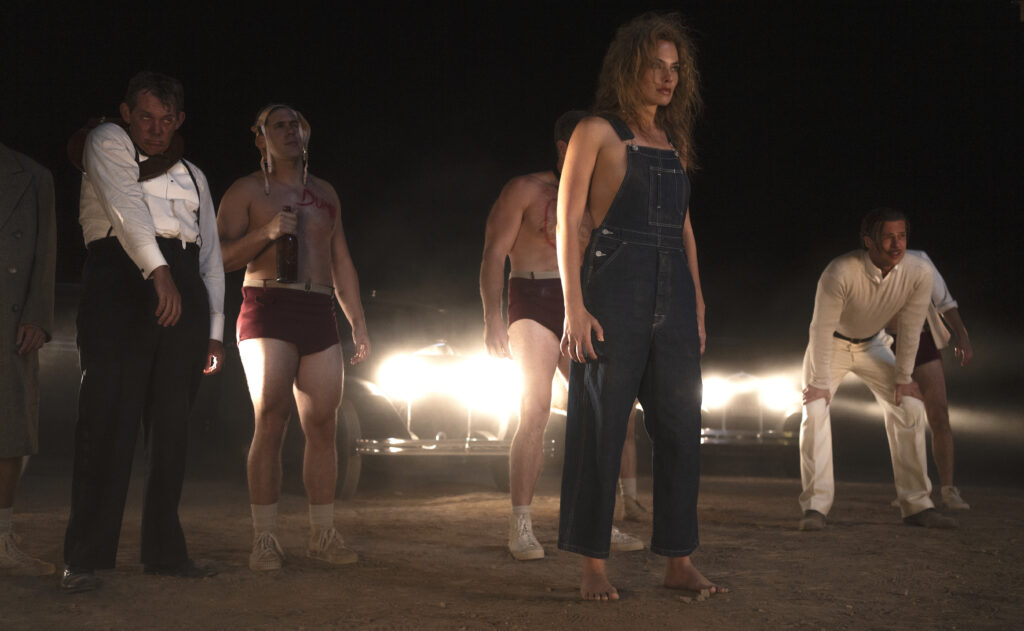
“Babylon” is cinematic vomit wrapped up in a pretty package. This movie stinks of being a phony, self-indulgent mess, but because of the pretty package, some people will insist that it’s great. And with a total running time of 189 minutes, “Babylon” wears out its welcome long before those three-plus hours are over. What’s even more irritating about “Babylon” is that it has a pretentious tone that it’s some kind of groundbreaking film. It’s not groundbreaking at all. It’s just a miscalculated, big-budget dud with awards aspirations but with a second-rate plot of a trashy B-movie.
Written and directed by Damien Chazelle (the Oscar-winning director of 2016’s “La La Land”), “Babylon” is being marketed as an “exposé” of the dark side of Hollywood, particularly from the mid-1920s to the early 1930s, when most of the movie takes place. (The entire time range of “Babylon” spans from 1926 to 1952.) This long-winded train wreck is actually just a series of scenes showing hollow people acting vain and stupid, while indulging in promiscuous sex, illegal drugs and unrelenting shallowness. It is decadence that looks overly staged, not natural, and certainly not fascinating. And that’s one of the biggest problems with “Babylon.”
An example of how “Babylon” looks too contrived is shown early in the movie, in a scene that is supposed to depict a sex orgy at a mansion in Bel Air, California. Everything about the sex looks too choreographed and fake, which automatically makes this scene lose any sex appeal that it intended to have. The scene is supposed make “Babylon” viewers feel like voyeurs, but all it does is make viewers think that what the cast members are doing in these sex scenes are too precise and perfectly timed to look convincing.
“Babylon” also overuses cheap and tawdry gimmicks of showing bodily functions—defecating, urinating and vomiting—with the type of juvenile glee of someone who tells not-very-funny vulgar jokes, just to try to shock people, when it’s actually not very shocking at all. The bodily functions aren’t offensive on their own, but they’re cynically used in the movie as an obvious ploy to get people to think that Chazelle is being “bold” and “daring,” just because he’s never had these types of scenes in his previous films. When these kinds of crass, “gross-out” scenes are in “Jackass” movies, at least they’re usually funny, and they aren’t pretending to be prestigious art. “Babylon” takes itself way too seriously to even be a good dark comedy.
“Babylon” begins in 1926, by showing service employee Manuel “Manny” Torres (played by Diego Calva), a Mexican immigrant who wants to break into showbiz, with two of his co-workers (played by J.C. Currais and Jimmy Ortega) while making a delivery in Bel Air. They are driving a truck that’s towing an elephant in an open cart that’s tied by rope to the truck. The elephant is being transported to a Bel Air mansion, where rich movie-studio mogul Don Wallach (played by Jeff Garlin) is having a party later that night. The elephant is supposed to be at the party, simply as a way for the party host to show off that he has the money to bring an elephant to his home.
The rope on the truck breaks while the truck is on a steep incline. The workers try frantically to prevent the cart containing the elephant from sliding down the incline. And for their efforts, the elephant defecates all over them, with everything shown in graphic detail. What the elephant does to these workers is kind of like what “Babylon” does to viewers who have the fortitude to sit through this asinine dump of a movie.
The party is where viewers first see the other main characters in “Babylon.” Most of these characters have very few redeeming qualities, as if it’s Chazelle’s way of saying that Hollywood in the 1920s attracted mostly corrupt and morally bankrupt people. People with a strong sense of personal ethics don’t last long in this story. “Babylon” is not interested in showing the reality that Hollywood has always attracted a wide variety of people, not just people who are heinous. “Babylon” only wants to give the most screen time and a narrow view to the ones that care the most about clawing their way to the top and possibly destroying the competition.
Movie star Jack Conrad (played by Brad Pitt), a sex symbol in silent films, thinks he’s at the top of his game. But his career has been fading and will soon be damaged by the arrival of talking pictures (movies with sound, also known as talkies) in the late 1920s. Jack is dropped off at the party by his soon-to-be ex-wife Ina Conrad (played by Olivia Wilde, making quick cameo in the movie), who is furious with Jack because he’s been openly cheating on her. Jack and Ina have a hostile conversation in their car, where she berates him for his infidelity and for speaking with a fake Italian accent to people he wants to impress. Before she speeds away in anger, Ina yells that she wants a divorce.
Nellie LaRoy (played by Margot Robbie) is a crude, fame-hungry aspiring actress, who literally crashes the party by crashing her car into another car in full view of the security guards outside. (It’s a minor fender bender.) And then, she argues with the security guards, who prevent an uninvited Nellie into the party. Expect to see Nellie doing a lot more yelling throughout “Babylon,” because her nasty temper is the epitome of her limited personality.
Manny, who witnesses this spectacle when it happens, is immediately infatuated with Nellie because of her physical beauty. And so, Manny lies when he tells the security guards that Nellie is an important person who’s been invited to the party. It’s the beginning of a dysfunctional relationship between Manny and Nellie, where she uses him to get her out of messes and help her in her career, while Manny hopes that Nellie will fall in love with him.
Elinor St. John (played by Jean Smart) is a very jaded and influential gossip columnist, who uses her lofty media position to give and take away clout, in regards to how people want their public images to be perceived. Not long after Manny arrives at the party as a “jack of all trades” service worker, Elinor makes a sexual advance at him, but he politely declines. Elinor is at the party mainly as an observer. She considers herself to be much smarter and tougher than the average Hollywood power player.
Sidney Palmer (played by Jovan Adepo) is a trumpet player in a jazz band where Sidney is considered the star. Sidney and his band have been hired to perform at this mansion party. Later, they get a chance to star in feature films, during the early years of talking pictures, and when it was trendy to have jazz stars perform their music in these movies.
Lady Fay Zhu (played by Li Jun Li) is an androgynous, openly queer or lesbian entertainer, who is described in the “Babylon” production notes as “Marlene Dietrich by way of Anna May Wong.” Fay develops an infatuation with Nellie, but Fay finds out the hard way that Fay’s sexuality is not as accepted by Hollywood star makers as it is when she goes to private parties or performs in nightclubs.
Some of the other “Babylon” characters, who have varying degrees of importance to the overall story include movie producer George Munn (played by Lukas Haas), who is Jack’s best friend, enabler and producing partner; Estelle Conrad (played by Katherine Waterston), Jack’s haughty next wife, a Broadway actress who looks down on people in the movie industry; and James McKay (played by Tobey Maguire), a wealthy, perverted and sadistic businessman who loans money to Nellie and threatens her life when she doesn’t pay him back.
Some of the industry players depicted in “Babylon” include movie producer Irving Thalberg (played by Max Minghella), who is based on the real Thalberg, but is a very bland and generic character in “Babylon,” when he shouldn’t be; media mogul William Randolph Hearst (played by Pat Skipper); and movie director Ruth Adler (played by Olivia Hamilton), a rare woman who helms major studio films. Hamilton is one of the producers of “Babylon” and is also Chazelle’s real-life wife, so it’s perhaps no coincidence that she was cast as one of the few women who has any real power in the movie.
Operating on the fringes of the Hollywood elite are Bob Levine (played by Flea), a sleazy “fixer” hired by movies studios to conceal scandals; Robert Roy (played by Eric Roberts), Nellie’s unsophisticated and domineering father/manager, who is not respected by many of the power players; The Count (played by Rory Scovel), a wannabe actor who supplies drugs to people in the movie industry; Max (played by P.J. Byrne), Ruth Adler’s ill-tempered and antisemitic assistant director; Wilson (played by Ethan Suplee), one of James McKay’s sycophant employees; and Constance Moore (played by Samara Weaving), a silent-film star whom Nellie sees as a rival.
Expect to see a lot of cocaine-fueled debauchery and nonsense in “Babylon,” as Nellie predictably becomes not only a silent-film starlet but also a self-destructive drug addict. Manny, with Jack’s help, breaks into the movie industry and ends up becoming a high-ranking production executive at a movie studio, but Manny keeps letting Nellie’s problems become his problems too. Meanwhile, Jack struggles with maintaining his status as a movie star when talking pictures literally make him a laughingstock with movie audiences.
“Babylon” can’t even be very original when it comes to the “scandals” in the story. Early on in the movie, a young, aspiring actress named Jane Thornton (played by Phoebe Tonkin) meets an untimely death during the party at the Wallach mansion in Bel Air. Before she dies, Jane is shown having a drug-induced, kinky sexual encounter with an older, wealthy man named Orville Pickwick (played by Troy Metcalf), who is overweight and wants Jane to call him “daddy” while she urinates on him.
Jane and Orville are just lazily written caricatures of real-life actress Virginia Rappe and actor Roscoe “Fatty” Arbuckle, who went on trial for (and was later acquitted of) Rappe’s death, after she passed away in 1921, during a party they both attended in San Francisco. In “Babylon,” when Jane’s death is discovered in the Wallach mansion, there’s a frantic rush to cover it up. “Babylon” changes the outcome of this real-life scandal, but viewers who know about the stars of the silent-film era will immediately notice that Orville and Jane are based on Arbuckle and Rappe.
“Babylon” has eye-catching cinematography and production design to make everything look dazzling. The costume design, hairstyling and makeup are mostly adequate but also very questionable, since Nellie sometimes looks like she’s from the 1970s, not the 1920s. And the film editing in “Babylon” cannot be praised for a movie this bloated and unwieldy.
The “Babylon” cast members, particularly Robbie, give performances where they look like they want to be noticed and rewarded with industry prizes. Ironically, in a movie that overloads on empty excess, the best and most realistic scene in “Babylon” is a simple but well-acted conversation between Elinor and Jack in Elinor’s office, when Elinor explains to Jack why he’s becoming a has-been.
Elinor is one of many underdeveloped characters in “Babylon,” which puts most of the emphasis on the antics of Nellie and Jack. Manny gets sidelined for a great deal of the movie and only becomes a big part of the story again when Manny is needed to help Nellie. Manny’s meteoric rise in the movie industry, which could have been shown in riveting details, instead is merely a backdrop to whatever reactions that Manny has to the drug-addled hedonism that is going on around him and in which he sometimes participates.
“Babylon” tries to make “social statements” about Hollywood’s mistreatment of queer people and people of color during this time period. However, those statements reek of glib tokenism. Fay is never presented as a whole person but only as a fetish for people who want to see a woman kiss other women, or as an Asian woman whose purpose is to satisfy white people’s sexual fantasies about Asian women.
Similarly, “Babylon” also treats Sidney as a token, because his biggest scene is a humiliating racist experience that he has on a movie set: Sidney is ordered to put blackened makeup on his face so that his skin will look as dark as his bandmates. “Babylon” has no interest in presenting Sidney as a fully formed human being. The movie does not care to reveal anything about his personal life or backstory, whereas the personal lives and backstories of other characters are on full (and sometimes disgusting) display.
“Babylon” is also insulting in how it wants audiences to spend a little more than three hours watching a movie overstuffed with scenes where it’s just a lot of people shouting at each other, doing drugs, and being paranoid about their careers—and somewhere in between, a few movies get made. The snake wrestling scene with Nellie is particularly idiotic, as anyone with basic medical knowledge of poisonous snake bites can tell you. All of these superficial and time-wasting shenanigans don’t add up to much of a cohesive story, but are really just a lot of scenes strung together like a pointless, rambling essay.
Nellie will be the most talked-about character in “Babylon,” but she isn’t even that compelling, because she comes across as a dime-a-dozen Hollywood starlet, not a true star. (The Nellie character is partially based on the real-life Clara Bow.) “Babylon” never shows Nellie having any actual talent as an actress or having a charismatic personality, which would be two of the main reasons why people would root for this air-headed egomaniac. Nellie berates and degrades people who try to help her, she’s a pathetic drug addict, and she only turns on the charm when she wants something from someone.
The character of Jack is presented as having some empathy for other people, such as in scenes where he treats service employees very well, and when he helps Manny get his first big break in the movie industry. But the way Jack is written in “Babylon” is that he’s essentially a stereotypical Hollywood “bad boy” who parties too much and is chronically unfaithful to his wife/partner. There’s a very “been there, done that” attitude that Jack seems to have, but the same could be said about how this entire character is portrayed in “Babylon.”
Pitt in “Babylon” is really just doing a 1920s version of what was already seen in writer/director Quentin Tarantino’s 2019 film “Once Upon a Time in Hollywood,” which was set in 1969. “Once Upon a Time in Hollywood,” which also co-starred Pitt and Robbie, was about fictional has-been actor Rick Dalton (played by Leonardo DiCaprio) and his stunt double/best friend Cliff Booth (played by Pitt, in an Oscar-winning role), as they encounter members of Charles Manson’s cult, with Robbie in the role of real-life bombshell starlet Sharon Tate. “Once Upon a Time in Hollywood” and “Babylon” both have themes about what the quest for fame will do to people in Hollywood and how changing trends in Hollywood can affect people’s careers. It’s easy for anyone to see which is the better movie.
Chazelle has a devoted fan base of people who think he can do no wrong. Many of those people are likely to heap rapturous praise on the soulless “Babylon,” just because Chazelle wrote and directed it and got some big-name stars to be in the movie. People who aren’t as susceptible to getting blinded by celebrity names can see “Babylon” for what it is: A vanity project created by filmmakers with enough money to throw around at a movie that’s just a series of scenes of people being obnoxious, with not much else to say. A very pretentious montage near the end of “Babylon” tries to look like an artsy tribute to filmmaking, but it just looks out-of-place in a film that’s already immersed in a lot of tackiness and storytelling muck.
There are plenty of artfully made and entertaining films about people doing very bad things. Oscar-winning director Martin Scorsese has made a career out of doing these kinds of movies. Simply put: “Babylon” is Chazelle’s ambitious but failed attempt to make a movie like Scorsese makes movies.
The reason why so many Scorsese films are classics, while “Babylon” will be known as a very expensive misfire, comes down to the believability of the characters and the story. People watching “Babylon” will feel like they’re watching privileged actors and actresses playing dress-up instead of truly embodying their characters. If the purpose of “Babylon” is to show how Hollywood can squander talent with overpriced and aimless movies, then that is perhaps the only area where “Babylon” truly succeeds.
Paramount Pictures will release “Babylon” in U.S. cinemas on December 23, 2022. The movie will be released on digital and VOD on January 31, 2023. “Babylon” will be released on Blu-ray and 4K Ultra HD on March 21, 2023.

